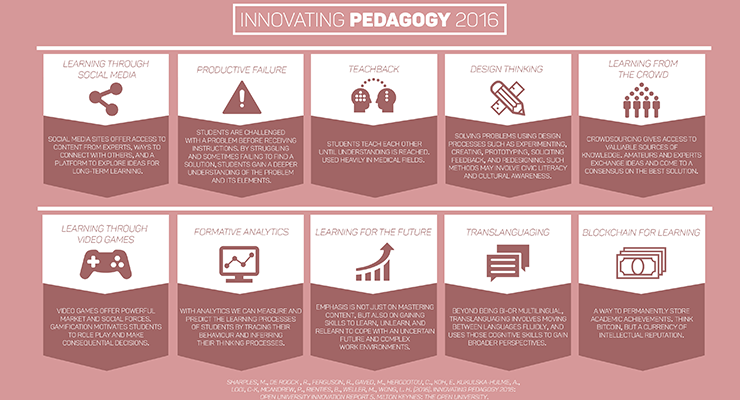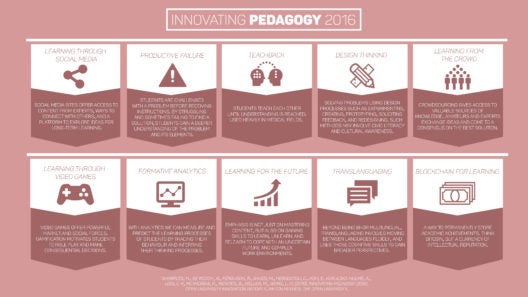
Categories:
Course Design
2016 Innovating Pedagogy Report
The 2016 Innovating Pedagogy Report proposes ten new innovations that explore ways of teaching, learning, and assessment for an interactive and engaged world. The report is produced in collaboration with SRI International and The Open University. The full document details several examples and studies to support these innovations. Below is a summary of those innovations. Which innovation might you tackle in the upcoming semester?
Image credit: Stephen Valdivia
- Learning through Social Media: Twitter, Facebook, and other sites offer access to direct content from experts, ways to connect with other learners and those working in their discipline, and a platform to explore ideas for long-term learning.
- Productive Failure: Students are challenged with a problem before receiving explicit instructions. By struggling and sometimes failing to find a solution, students gain a deeper understanding of the problem and its elements.
- Teachback: Students teach each other until understanding is reached. Used heavily in medical fields.
- Design Thinking: Solving problems using design processes such as experimenting, creating, prototyping, soliciting feedback, and redesigning. Such methods may involve civic literacy and cultural awareness.
- Learning from the Crowd: Crowdsourcing gives access to valuable sources of knowledge. Amateurs and experts exchange ideas and come to a consensus on the best solution.
- Learning through Video Games: Video games offer powerful market and social forces. Gamification motivates students to role play and make consequential decisions.
- Formative Analytics: With analytics we can measure and predict the learning processes of students by tracing their behavior and inferring their thinking processes.
- Learning for the Future: Emphasis is not just on mastering content, but also on gaining skills to learn, unlearn, and relearn to cope with an uncertain future and complex work environments.
- Translanguaging: Beyond being bi-or multilingual, translanguaging involves moving between languages fluidly, and uses those cognitive skills to gain broader perspectives.
- Blockchain for Learning: A way to permanently store academic achievements. Think bitcoin, but a currency of intellectual reputation.
Source:
Sharples, M., de Roock , R., Ferguson, R., Gaved, M., Herodotou, C., Koh, E., Kukulska-Hulme, A., Looi, C-K, McAndrew, P., Rienties, B., Weller, M., Wong, L. H. (2016). Innovating Pedagogy 2016: Open University Innovation Report 5. Milton Keynes: The Open University.

Leave a Comment
Your email address will not be published. Required fields are marked *